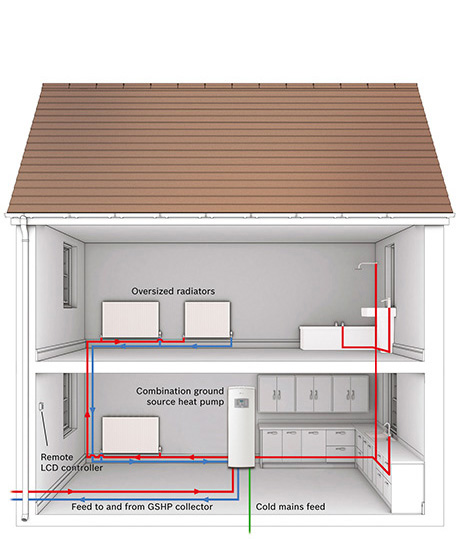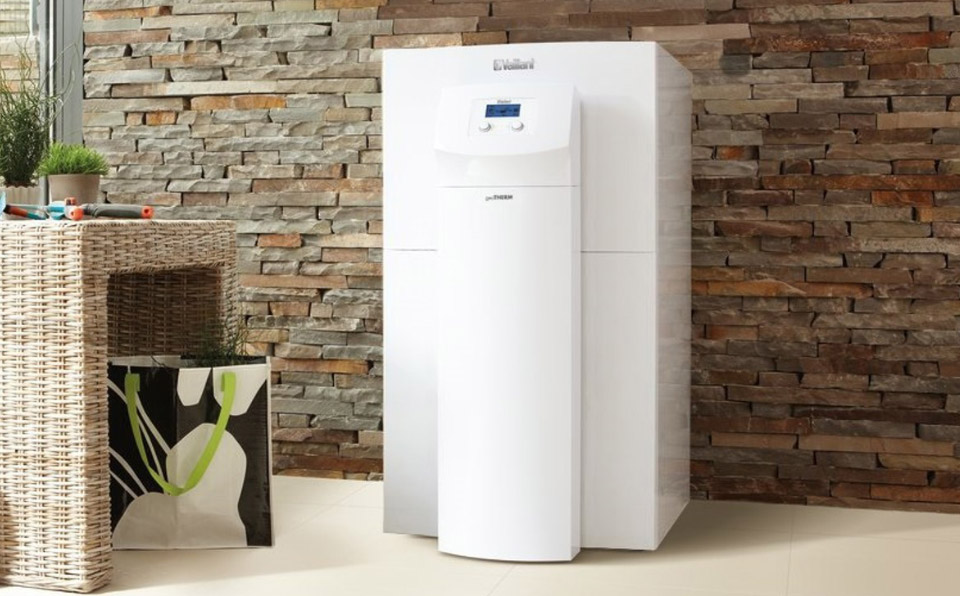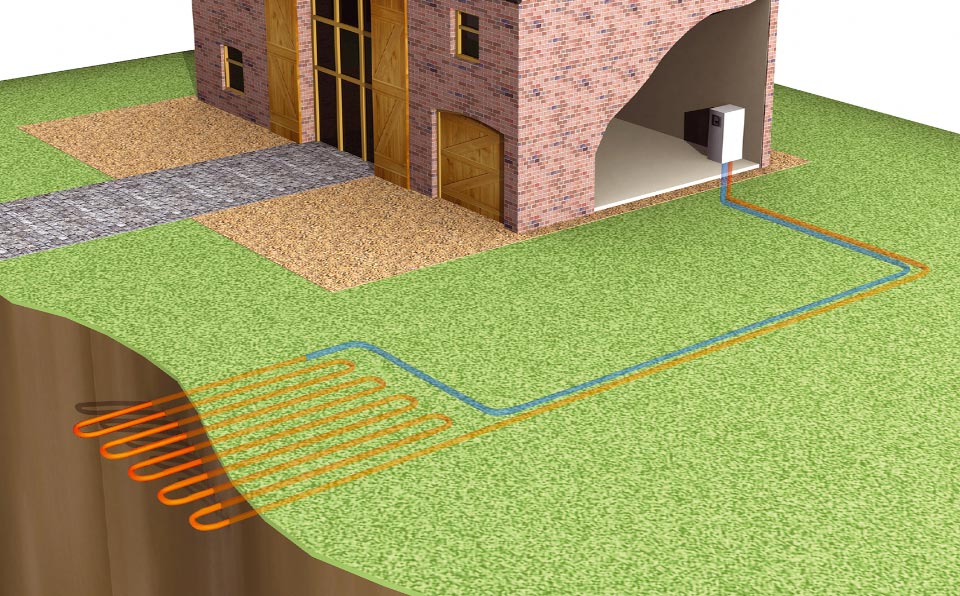
GROUND SOURCE HEAT PUMPS
A ground source heat pump system draws heat from underground and boosts it to a higher temperature using a heat pump. This heat is then used to provide home heating or hot water. The pump needs electricity to run, but the idea is that it uses less electrical energy than the heat it produces.
The heat pump performs the same role as a boiler does in a central heating system, but uses ambient heat from the ground rather than burning fuel to generate heat.
A mixture of water and anti-freeze is pumped around the ground loop and takes in the heat found in the ground. The heat pump itself then takes this heat and increases its temperature. The process is similar to that used to cool a fridge, and the pump is made up of an evaporator, a compressor and a condenser. This heat can then be used in a radiator, hot water or in an underfloor heating system. Whether you’ll need a back-up heating system for additional energy or water heating will depend on the heating needs of your home.
Air source heat pumps are also available. These are usually placed outside at the side or back of a property, and take heat from the air.
Ground source heat pump systems
Ground source heat pump systems are made up of a ground loop (a network of water pipes buried underground) and a heat pump at ground level. You’ll need sufficient space for installation of the system, generally with a garden accessible to digging machinery.
Heat pump costs and payback
Ground source heat pumps differ in size and complexity, so pinpointing a typical cost is tricky. The Energy Saving Trust (EST) estimates it can range between £9,000 and £17,000 to install one in your home. The payback period (the time it takes for that initial cost of the system to be recouped in energy savings) is equally elusive and will depend on how efficiently your system works, the type of system you’re replacing and how you’ll be using the heat generated from the pump. Here are some general rules of thumb to bear in mind:
Ground source heat pumps are generally better suited to new-build properties than retrofit – this is because costs could be reduced if the heat pump is included as part of the building specification, rather than having to retrofit underfloor heating later on.
Heat pumps can save you more on your heating bills if you’re replacing an electric, LPG or coal system – but, currently, might not lead to great savings if you are on the gas network.
A well-insulated house is essential to best optimise the heat generated by your ground source heat pump – otherwise the heat the pump generates escapes more easily.
The heat produced by a ground source heat pump comes at a lower temperature than other forms of heating, making it best suited to underfloor heating, which requires lower temperatures, rather than radiators (or, if radiators are used, they should be properly-sized).
Running costs can be higher if you’re also using the system for your hot water supply, and you may require a supplementary electric immersion heater to keep up with your heating needs.
The payback period will be shorter if your current heating system is electric, LPG or oil.
Once in place, the ground loop element should require little maintenance.
Heat pumps qualify for the Boiler Upgrade Scheme which is offering a £7,500 grant towards the cost the installation of a ground or air source heat pump.

Heat pump servicing
We carry out servicing and maintenance to air source heat pumps, ground source heat pumps and exhaust air heat pumps for all major manufacturers including NIBE, Vaillant and Mitisibushi.
We pride ourselves in being NIBE Pro installers and have been working on their heat pump systems for over 15 years.
Heating bill savings?
How much money you save a year depends not just on these factors but also on whether the system is the right size, installed correctly and used correctly by householders. The EST says that a ‘typical’ ground source heat pump could save you £50 (replacing oil heating) to £420 (replacing electric heating) a year. But be aware that only some of the heat pumps the EST monitored in recent trials achieved reductions in heating bills. It found wide-ranging variations in performance, with the biggest heating bill reductions for households off the gas grid.
Which? thinks more evidence is needed to better understand the cost savings possible per household. The EST has also highlighted the need for further study of heat pumps on an installation-by-installation basis.
Benefits of ground source heat pumps
- Ground-source heat pumps generate less CO2 than conventional heating systems.
- You need to use electricity to power the pump which circulates the liquid in the ground loop, but for every unit of electricity used by the pump, you get between two and four units of heat – making this an efficient way to heat a building.
- Cheaper Economy 7 electricity tariffs can be used to lower the cost of electricity to power the heat pump and special heat pump tariffs may be available from some electricity suppliers – alternatively consider solar photovoltaic panels or a wind turbine (if you are in a suitable area) for a greener source of electricity.













